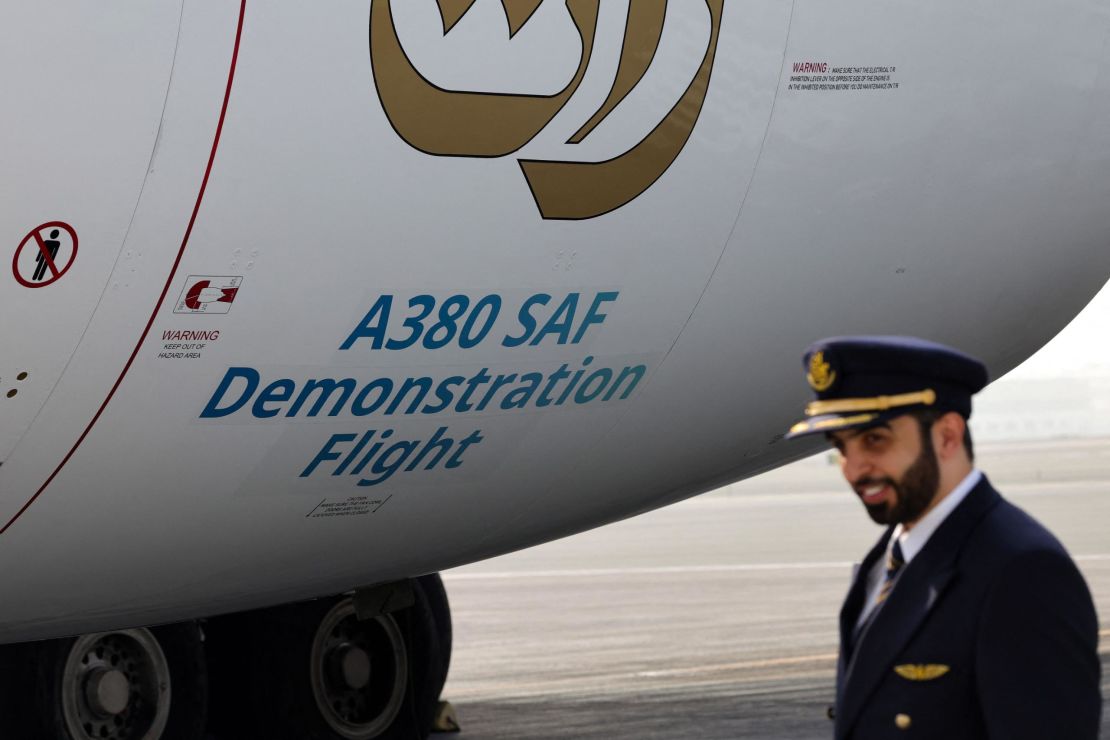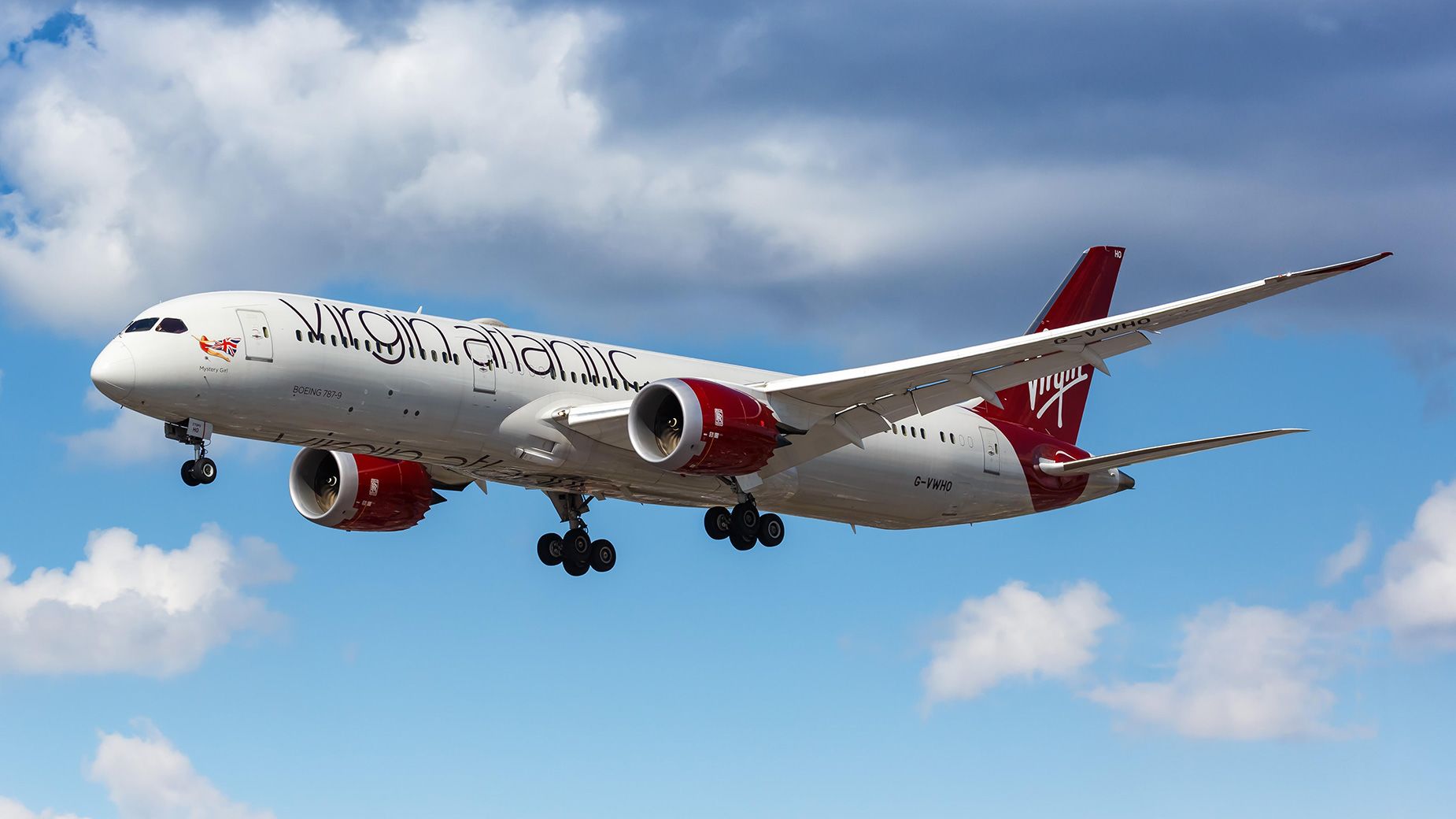For the first time, a transatlantic flight operated by a commercial airline will be powered by 100% Sustainable Aviation Fuel (SAF) — a type of plane fuel that bears the promise of a much lower climate impact than traditional ones.
Traveling from London Heathrow to New York’s JFK, the flight, which is meant purely as a demonstration and will not carry any paying passengers (although it will carry scientists and media), is operated by Virgin Atlantic using a Boeing 787, with both its engines running on the fuel.
However, while Virgin Atlantic says that using SAF will reduce the aircraft’s emissions by 70%, critics say the flight is little more than a gimmick, and that the kind of SAF used by the plane will do little to clean up aviation’s climate impact.
Commercial restrictions
Current regulations prohibit airlines from using a blend of more than 50% SAF on commercial flights, as engine manufacturers and aviation authorities work together to ensure that these new fuels are safe to use in higher concentrations.
To operate the flight, a special permit was issued by the UK Civil Aviation Authority, which came after a series of technical reviews including ground tests with 100% SAF on the same type of engines used during the flight.
The flight is the latest in a series of recent tests involving 100% SAF. Last week, Emirates powered one of the four engines of an Airbus A380 superjumbo with it. Days earlier, business jet maker Gulfstream completed what it billed as the world’s first transatlantic flight using 100% SAF. Large twin-engine jets have performed flights using 100% SAF on both engines before, but these flights involved military aircraft.
The flight will use a total of 70 tons of SAF, mostly made from waste cooking oils and animal fat, plus a small portion coming from corn waste used to produce animal feed. Virgin Atlantic says that the SAF alone will cut the flight’s emissions by 70%, but it is also adopting other measures to limit environmental impact and increase efficiency, such as operating the taxi phase (when the plane goes from gate to runway) with just one engine, and limiting the amount of potable water onboard to what is strictly necessary, reducing weight.

SAF is a big bet for commercial aviation, which produces about 2.5% of global carbon emissions but is facing a harder path to decarbonize than other sectors. According to the International Air Transport Association (IATA), SAF will play a major role in the industry’s path to net zero, which it hopes to achieve by 2050: by then, up to 65% of the reductions in emissions will come from it.
Although SAF burns like normal jet fuel and produces the same amount of emissions while the plane is flying, it has a lower carbon footprint during its entire production cycle, because it’s usually made from plants that have absorbed carbon dioxide (CO2) from the atmosphere when they were alive. That CO2 is released back into the atmosphere when the SAF burns, whereas burning jet fuel made from fossil fuels emits carbon that had been locked away.
Not all SAFs are equal
SAF can be made in several different ways, including using exclusively renewable energy rather than plant waste. However, it is currently more expensive — up to 6 times — than regular kerosene, and represents just 0.1% of all jet fuel in use globally, meaning its impact is currently very far from the levels needed to meet IATA’s future projections.
The goal of Virgin Atlantic’s flight and those before it is to provide data about technical feasibility, as well as bring attention to these new sustainable fuels in a bid to scale up their production.
However, according to Cat Hewitt, policy director at the Aviation Environment Federation, a UK non-profit that monitors aviation’s environmental impact, the flight is more of a gimmick than a game changer. “One flight on 100% alternative fuel isn’t going to change the fact that 99.9% of aviation fuel is fossil fuel and there’s no great option for feedstock (raw materials) that can be scaled up sustainably,” she says.
Hewitt says that while advocates argue that using a fuel made from plants offsets the plane’s tailpipe emissions, if the fuel is made from waste products, the carbon dioxide would have been captured regardless, “So we’re not convinced there’s really any carbon reduction associated with this fuel.”
She adds that while most SAF is currently produced from waste, the only truly sustainable option is to make a synthetic fuel produced using captured carbon combined with green hydrogen. However, Hewitt adds that these “e-fuels” are “very expensive and very energy intensive to produce.”
“We would need to hugely increase our supply of renewable energy to be able to make these fuels in meaningful quantities, and airlines would need to be prepared to pay a lot more,” she says.

Scaling up is also going to be a challenge, Hewitt adds, citing a report from the Royal Society, the UK’s national academy of sciences, which states that producing enough biofuels to sustain domestic use would require more than half of the country’s agricultural land.
However, Graham Hutchings, who chaired the group that compiled that report, doesn’t believe that the Virgin Atlantic flight is a gimmick. “I think it’s important as it raises the awareness in the public,” he says. “In the short term, SAFs are likely to play a part as a ‘drop-in’ fuel that can work in existing aircraft engines while other technologies develop. But industry, regulators and legislators need to ensure that their environmental impacts are fully accounted for.”
Matteo Mirolo, SAF lead at the European Federation for Transport and Environment, which bills itself as Europe’s leading clean transport campaign, agrees that the focus should be on synthetic fuels and advanced biofuels, which have greater potential than current waste-derived ones. “SAF is not a single thing, but an umbrella term for lots of different ways of making jet fuel,” he says. “Some of them can reduce aviation’s climate impact, whilst others can be a cure worse than the disease.”
Hewitt added: “Until we have genuinely zero-emission technology available for flying, there’s really one thing that we know definitely works to cut aviation emissions — and that’s to fly less.”

